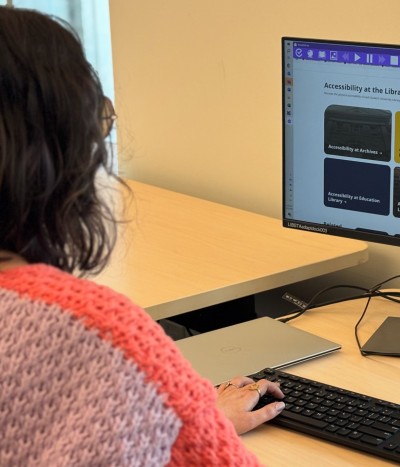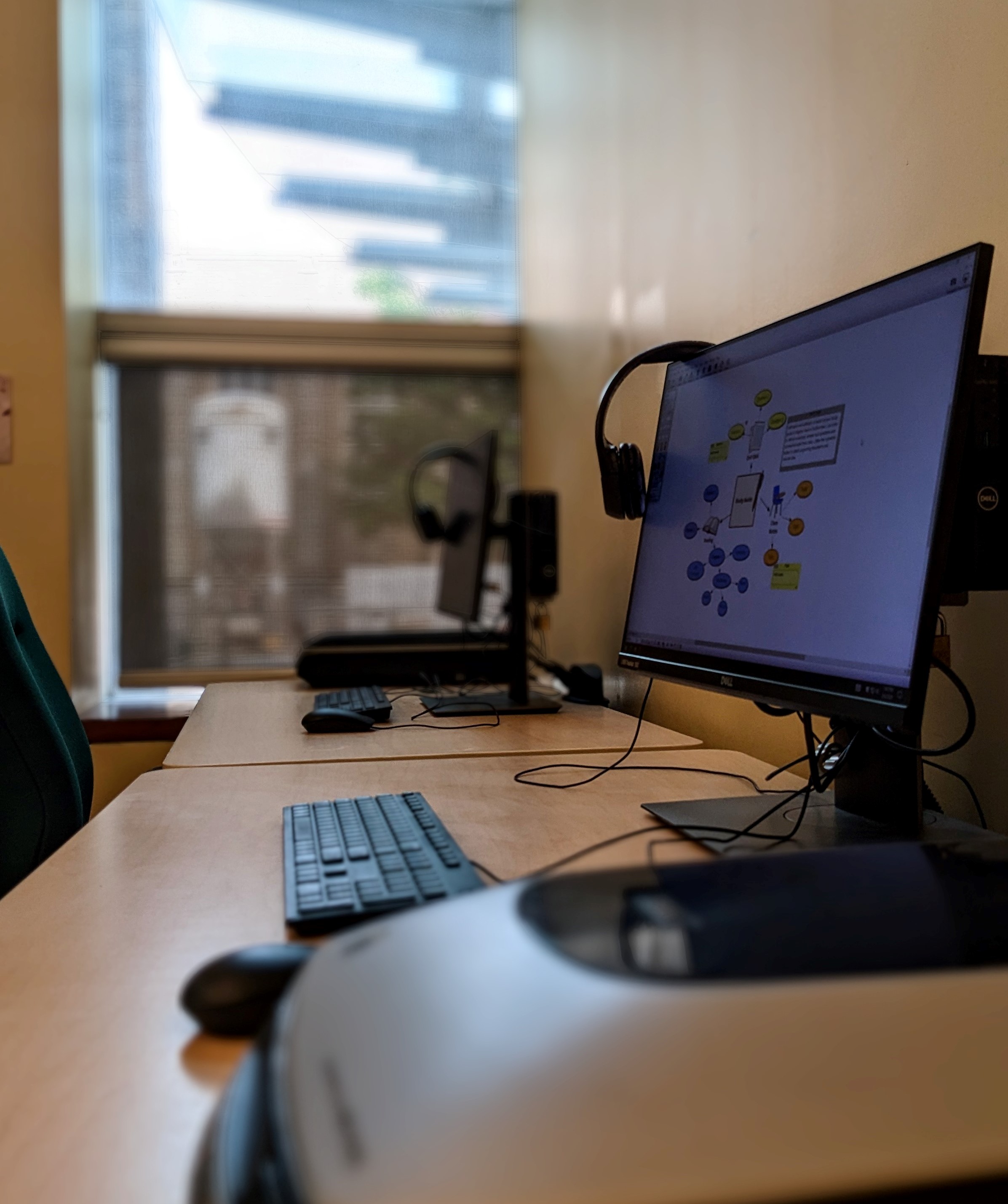
About the Adaptive Technology Centre
Welcome to the Adaptive Technology Centre (ATC). The ATC can be found in Stauffer Library rooms 119 and 120. The ATC provides a dedicated quiet study area for students with disabilities and it is the home of Library Accessibility Services.
Located in Stauffer Library room 120, the ATC study space is equipped with three study rooms, computer docking stations, computer stations with assistive software, and a variety of lounge seating. The ATC offers specialized software to meet your specific learning needs. This space is for use by students registered with Queen's Student Accessibility Services (QSAS) and with the Adaptive Technology Centre.
Located in Stauffer Library room 119, Library Accessibility Services provides access keycards to the ATC study space, alternate format, adaptive technology services, and mediated research help.
Access
We are happy to welcome you to our Adaptive Technology Centre, a dedicated space for students with accessibility needs. The Adaptive Technology Centre includes a keycard-only study space for use by students registered with QSAS and students directly registered with the ATC.
A keycard is required to access the Adaptive Technology Centre’s study space in Stauffer 120. ATC Access Keycards are available to students registered with QSAS;Keycards are registered to individuals and we ask that you do not share them with others.
Keycards are issued by Library Accessibility Services staff. Please email library.atc@queensu.ca if you would like access to this study space and review our guidelines before using the space.
A keycard is not required to access the Library Accessibility Services staff offices. These offices are located in Stauffer 119. Library Accessibility Services is open Monday to Friday, 8:30am to 4:30pm.
If you are a student with a disability and not registered with QSAS, please contact the Library Accessibility Services staff to make arrangements to use the study space.
Please review these guidelines before using the space:
- Students should not have prolonged or loud conversations in the <abbr title="Adaptive Technology Centre">ATC</abbr>.
- Phone, Zoom or Teams calls are not to made in the lab space. Students needing to make a call may book one of the ATC study rooms.
- The study rooms and lab workstations are for individual use; therefore, group work is not permitted in the ATC.
- There are several bookable group study rooms available throughout Queen's University Library.
- One support person may accompany a student in the ATC lab or study rooms. We ask that you do not collaborate in the lab space to maintain a quiet work environment.
- Study rooms are primarily for quiet study or for the use of adaptive technologies.
- Students must book the study rooms in advance online.
- Students are expected to follow the Code of Conduct for Library Users. Those who are loud or disruptive to others may be asked to leave the space.
- Students are also expected to respect the Food & Drink in the Library policy.
- Please do not leave any personal belongings unattended in the lab or in the study rooms.
- Please return any library books or reserve equipment when finished.
Lab
The lab is a quiet study environment with workstations, scanners, a printer, and lounge seating.
Software available in the lab includes:
- Text-to-Speech software that allows students to scan their texts into the computer, which converts the text into a digital format and uses a speech synthesizer to read it aloud (Kurzweil 3000, Read&Write).
- Digital Math and STEM software to create equations, formulas, and more, digitally and accessibly (EquatIO).
- Voice-to-Text software that allows users to speak into a microphone while the computer transcribes their voice into a digital format (Dragon Naturally Speaking).
- Screen Reading software that reads the computer screen aloud to students, replacing the graphical user interface with auditory interface (JAWS).
- Mind-Mapping software that assists students in the brain-storming process and thought organization which assists the writing process (Inspiration).
- Screen Magnifier software that allows students to magnify the size of documents and other software applications that appear on the screen (ZoomText).
- Writing software that assists students with word prediction, grammar, and spelling errors in documents (Read&Write, Kurzweil 3000).
The following physical accessibility features can be found in the lab:
- Height-adjustable desks
- Computer monitors (docking stations & computer stations)
- Ultra wide screen monitors (docking station)
- Relaxation area
- EPSON desktop scanners
The Adaptive Technology Lab offers a limited number of lockers for student use. Access to these lockers is managed by the Adaptive Technologist. Students interested in using the lab's lockers should speak to the Adaptive Technologist at the beginning of each semester.
Contact our Adaptive Technologist
The Adaptive Technology Lab has a lounge area with three comfy chairs and a small table. This area includes sensory toys and colouring pages.
The lab also features two pod seats with retractable tables.
Students can print from their own device or from any of the ATC workstations to the printer in the lab using the library’s printing (PrintQ) system.
Scanning is available through the desktop scanners and through the lab's printer.
Study Rooms
Study rooms are for individual use; however, a support person may accompany a registered student into the study rooms. Study rooms must be booked in advance.
There are two study rooms with computers equipped with adaptive technology (120B & 120C) and one study room with a laptop docking station (120D).
Assistive Technology in this Room
- Dragon Naturally Speaking, a speech recognition software for creating documents from speech to text.
- ZoomText, a magnifier and screen reader software which automatically reads text on the screen, including typing.
- Kurzweil 3000, a text to speech with additional notetaking and assignment planning features.
- JAWS, a screen reading software equipped with both text to speech and Braille capabilities.
- Inspiration, a mind-mapping software with templates for planning projects and assignments.
- Read&Write, which allows students to have their documents read aloud.
- EquatIO, which allows students to create formulas and equations digitally.
Equipment in this Room
- Whiteboard
- Height adjustable desk
- Headphones
- Speakers
- Adjustable overhead lighting
Assistive Technology in this Room
- Dragon Naturally Speaking, a speech recognition software for creating documents from speech to text.
- ZoomText, a magnifier and screen reader software which automatically reads text on the screen, including typing.
- Kurzweil 3000, a text to speech with additional notetaking and assignment planning features.
- JAWS, a screen reading software equipped with both text to speech and Braille capabilities.
- Inspiration, a mind-mapping software with templates for planning projects and assignments.
- Read&Write, which allows students to have their documents read aloud.
- EquatIO, which allows students to create formulas and equations digitally.
Equipment in this Room
- Whiteboard
- Height adjustable desk
- Headphones
- Speakers
- Adjustable overhead lighting
Equipment in this Room
- Computer docking station
- Height adjustable desk
- Headphones
- Speakers
- Adjustable overhead lighting
Contact Us
Library Accessibility Services staff are here to assist you with your questions about the Adaptive Technology Centre. We also welcome feedback on how we deliver our services and provide facilities to persons with disabilities. You can contact library.atc@queensu.ca or one of our specialists.


